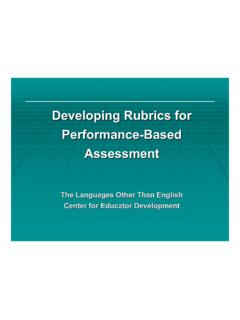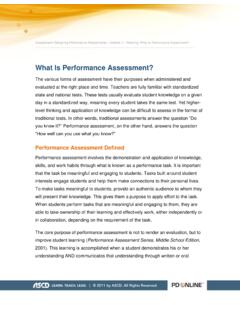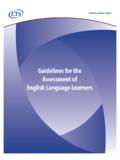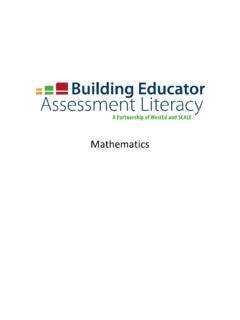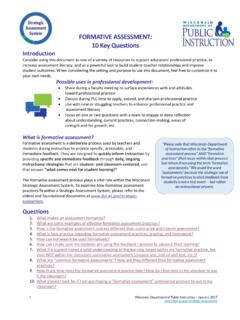Transcription of Student Self-Assessment: The Key to Stronger Student ...
1 Student Self-Assessment: The Key to Stronger Student Motivationand Higher Achievementby James H. McMillan and Jessica HearnIn the current era of standards-based education, Student self-assess-ment stands alone in its promise of improved Student motivation andengagement, and learning. Correctly implemented, Student self- assessment can promote intrinsic motivation, internally controlledeffort, a mastery goal orientation, and more meaningful learning. Its pow-erful impact on Student performance in both classroom assessmentsand large-scale accountability assessments empowers students toguide their own learning and internalize the criteria for judging this article we will define Student self- assessment and its importancein influencing Student motivation and learning.
2 We begin with a detaileddefinition of self- assessment , then review pertinent theoretical andresearch literature that supports the positive impact of Student self- assessment in the classroom. Our intent is to show that, based on boththeoretical and applied research and theory, self- assessment works, andthat by applying a set of practical steps teachers can facilitate this kindof assessment and reap the Is Student Self- assessment ?Self- assessment could mean that students simply check off answerson a multiple-choice test and grade themselves, but it involves much morethan that.
3 Self- assessment is more accurately defined as a process bywhich students 1) monitor and evaluate the quality of their thinking andbehavior when learning and 2) identify strategies that improve theirunderstanding and skills. That is, self- assessment occurs when studentsjudge their own work to improve performance as they identify discrep-ancies between current and desired performance . This aspect of self- assessment aligns closely with standards-based education, which providesclear targets and criteria that can facilitate Student self- assessment . The40pervasiveness of standards-based instruction provides an ideal context inwhich these clear-cut benchmarks for performance and criteria for evalu-ating Student products, when internalized by students , provide theknowledge needed for self- assessment .
4 Finally, self- assessment identifiesfurther learning targets and instructional strategies (correctives) studentscan apply to improve , self- assessment is conceptualized here as the combination ofthree components related in a cyclical, ongoing process: self-monitoring,self-evaluation, and identification and implementation of instructionalcorrectives as needed (see Figure 1). Essentially, students identify theirlearning and performance strategies, provide feedback to themselvesbased on well-understood standards and criteria, and determine the nextsteps or plans to enhance their 1.
5 Student Self- assessment CycleThe Self- assessment ProcessSelf-monitoring, a skill necessary for effective self- assessment ,involves focused attention to some aspect of behavior or thinking(Schunk 2004). Self-monitoring students pay deliberate attention towhat they are doing, often in relation to external standards. Thus, self-monitoring concerns awareness of thinking and progress as it occurs,and as such, it identifies part of what students do when they second component of self- assessment , self-judgment, involvesidentifying progress toward targeted performance .
6 Made in relation toestablished standards and criteria, these judgments give students a mean-ingful idea of what they know and what they still need to learn (Bruce2001). The standards are benchmarks and the criteria are guidelines forStudent Self-Assessment41 Learning Targets and Instructional CorrectivesImplementing strategies to improve performanceSelf-MonitoringAwareness of thinking or actionsSelf-JudgmentKnowing progress toward learning targetsinterpreting the level of performance students have demonstrated. Thedevelopment and application of criteria in evaluating current perform-ance enable meaningful evaluations, as long as the criteria are appropri-ately challenging (Rolheiser and Ross 2001).
7 According to Rolheiser andRoss, students who are taught self-evaluation skills are more likely topersist on difficult tasks, be more confident about their ability, and takegreater responsibility for their work (Section 5A).The third essential step is that students choose subsequent learninggoals and activities to improve partially correct answers, to correct mis-understandings, and to extend learning. Because students at this stageneed skills in determining learning targets and further instruction thatwill enhance their learning, they should be aware of options for furthergoals and instruction.
8 Once the appropriate instructional correctives, as they are referred to, are complete, students resume growing literature on formative assessment has implications forself- assessment . Formative assessment can be defined as employingappropriate activities to provide feedback to enhance Student motiva-tion and achievement during instruction as students learn. Providinghelpful information as learning occurscontrasts with providing feed-back solely after instruction. There is substantial evidence that appropri-ate formative assessment activities relate positively to Student motivationand achievement (Black and Wiliam 1998).
9 In addition, self- assessment isa valuable skill in effective formative assessment . Both Sadler (1989) andBlack and Wiliam (1998) contend that self- assessment is essential tousing feedback appropriately. Indeed, according to Black and Wiliam it is a sine qua nonfor effective learning (p. 26).A Theoretical Rationale for Enhancing Self-AssessmentTheories from at least three areas of study provide convincing ratio-nales for nurturing and enhancing Student self- assessment . These areasinclude 1) cognitive and constructivist theories of learning and motiva-tion, 2) metacognition theory, and 3) self-efficacy and Constructivist Learning and Motivation TheoriesSelf- assessment is an essential component of cognitive and con-structivist theories of learning and motivation.
10 Shepard (2001) pointsout that Student self-monitoring of learning and thinking is important inthe knowledge construction that lies at the heart of such theory. That is, students construct meaning, in part, by self-assessing prior to and duringlearning. students organize, evaluate, and internalize when learning, andself- assessment is part of that process. They must connect new knowl-edge, understandings, and skills with what they have already stored andused. Self- assessment fosters students ability to make these connectionseducational HORIZONS Fall 2008 42themselves; provides a mechanism to enhance learning in a meaningful,rather than rote, manner; and results in greater Student motivation goal-theory perspective on motivation represents a cognitivetheory about how students internalize different types of ability goals andthe effects of those goals on self- assessment , persistence, and achieve-ment.










